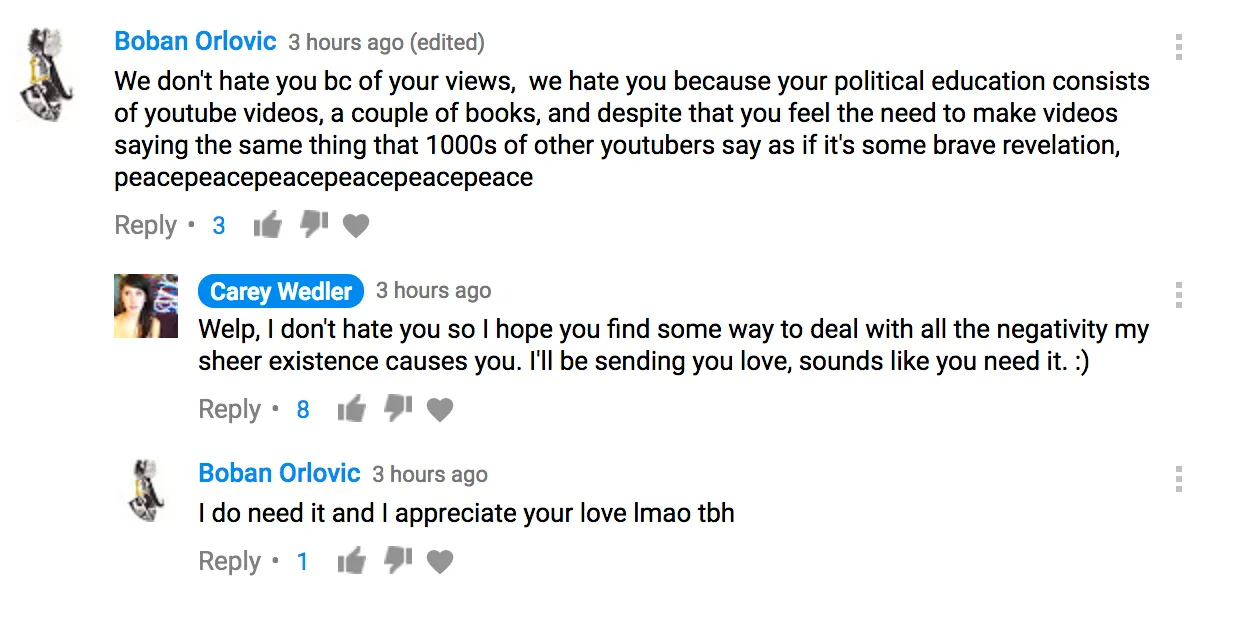I’ll never forget the first insult the internet threw at me in response to one of my videos.
“Her earlobes are uneven!”
This was actually funny, and let’s be real, my lobes are probably asymmetrical (or at least look that way, especially I tilt my head to one side when I’m ranting in proper valley girl form).
But I had no idea what would come my way as I produced more videos, which focus on controversial topics that tend to offend adherents to both left-wing and right-wing dogma. Here are some highlights from over the years that include attacks on my appearance and voice, weird sexual comments, assaults on my intelligence, and urgings to kill myself (real talk: I procrastinated gathering these for days because of how much anxiety it gives me to scroll my comments).

Here are some attacks on my appearance and the sound of my voice:



(The above comment was left on a rap response video I made after Eminem’s anti-Trump performance.)
Here are some weird sexual and sexist comments:





Here are couple urging me to off myself, including one from a Jew who is racist against other Jews:


And here are some showing how confused the collective internet can truly be (I’m a super Jew according to one commenter but a neo-Nazi working for Satan, according to another). There’s also some classic internet anti-semitism:


Others assume my political beliefs, making conjectures with no basis in reality (had the commenters watched a fraction of my videos, they’d see their assumptions were wrong ¯_(ツ)_/¯):





This is just a small sampling (I tried to find the classic and recurring line about how I should go to the Middle East and get raped/stoned/beheaded for wearing a tank top so I learn to appreciate America, but my tolerance maxed out at 45 minutes of scrolling!)
Receiving comments, emails, and private messages like these used to really throw me off. I’m sure many of you can relate to the common human tendency to instinctively disregard 99 instances of positive feedback because of one insult. That being said, my ratio of mean comments tends to be a little higher than that.
I’ve been rather traumatized by the internet, but before I go any further, I want to make it clear that this in no way compares to real-world struggles like living in or participating in a war zone, being abused by police officers, experiencing hate-motivated violence (or any kind of unprovoked violence), childhood trauma, or any wide variety of the many difficult situations we endure in the course of the human experience.
I choose to put myself out there on the internet (though when I first started I never stopped to consider reactions — I had something to say so I said it), and I’m willing to accept the consequences of being repeatedly berated and insulted.


There’s something to be said for toughening up and learning that not everyone on this planet is going to be sweet to me. That being said, my friends and family are sincerely scared when they scroll my public posts. “I worry about you when you post your videos, you were just always such a sensitive little girl,” my dad told me once, and my mom insists on reading the comments no matter how many times I advise her it’s a terrible idea. “Oh my god, Carey!” is usually what my friends say when they look at the engagement on my public pages.


I’ve learned to take steps to lessen the anxiety I feel when checking the interactions on my public pages. I meditate for at least ten minutes every morning before I check notifications or scroll comments, and for the most part, I try to avoid them altogether. It’s just not worth it to me.
Enter Steemit.
I joined less than two weeks ago, but as with other platforms, I’ve found myself scared to read the comments. Just as on Youtube and Facebook, I feel my heart tighten up and my pulse increase when I see the number of responses to my posts rising. I cautiously click myself into the comments prepared to face people who are coming at me in battle mode.
But much to my surprise, Steemit is nothing like these other platforms.
As @aggroed, @kennyskitchen, and other awesome people on Steemit have explained to me, there’s actually an incentive to be nice. If you’re rude for the sake of being rude or are needlessly insulting, you will likely be flagged and, as a result, lose money. Apparently, not many people want to take that risk.
The most remarkable thing about this isn’t that I’m protected in a bubble with only people who agree with me. I’ve seen comments that do disagree with my opinions, but they’re civil. Sometimes people are civil on Facebook when they think my views are incorrect or misguided, but such calm communication amid conflicting views is often the exception rather than the norm.
Regardless, in my view, these types of respectful interactions are vital to establishing a truly free society. We can adhere to the non-aggression principle all we want (and we should), but without basic human decency and kindness, it’s difficult to find happiness and connection, which I believe are absolutely vital for harmony and a working, voluntary society.
While some factions of our current paradigm may advocate passing laws enforced through violence to stop online bullying (amounting to bullying to stop bullying), Steemit is proving to be a perfect example why we don’t need the State – or centralized forms of communication. Where Facebook and Youtube effectively censor content through algorithms and place people in echo chambers, Steemit provides total freedom. Where Facebook and Youtube often serve as platforms for condescension, anger, and contempt, Steemit offers an elevated forum to discuss ideas (I also do want to note that there are many kind and supportive people on these other platforms, too, but there are far more trolls and hatred than I’m finding here).
This discussion of ideas is what drives humanity forward, and being able to do so in a friendly, intellectual manner ultimately — at least to me — represents an activation of the heart and a path towards healing., both internally and externally.
In my first Steemit-exclusive piece (besides my intro), I linked to meditations by Robert Strock, an LMFT (Licensed Marriage and Family Therapist) who has developed a therapy practice called Humanistic Spirituality. In one of his writings, he discusses the importance of tone of voice and how being mindful of how we express ourselves can help foster healthier and more compassionate communication. Though in this post I’m discussing interactions on the internet where we can’t “hear” tone, I still think his observations are still highly relevant:
“As a result of bringing awareness to our own tones, we can often anticipate not only what tone we are likely to receive. We can also see how we interact with others. In this way, we can avoid knee jerk reactions and we can guide ourselves to our hearts instead of our defensive tones.
“When we are not blind-sided by someone’s lecturing attitude, instead of withdrawing, we can stay more engaged. Instead of being aggressive, we can guide ourselves to a calmer tone. This doesn’t mean we won’t have an internal reaction. We might very well have the same reactions for years to come, but through “pre-meditation,” (anticipating ahead of time), we can learn to contain these reactions by focusing our attention on the qualities we want to energize in our hearts. We might focus on being more calm, courageous, patient or whatever else is most needed. Remember that this containment is not the same as suppression or lack of authenticity. Accepting these reactions instead of dumping them on someone else gives us a chance to harmlessly be with our true reactions while we respond with our hearts.“
My path in promoting peace and freedom has evolved over the six-and-a-half years I’ve been putting content on the internet. Whereas I started (understandably) angry at all the violence and exploitation in the world, I’ve undergone — and continue to undergo — a very steep learning curve when it comes to having empathy and compassion for others. I’m personally not ready (or experienced or zen enough) to effectively communicate every message I want to in a universally calm tone, though I’ve gotten exponentially better at taming my reactivity in comments sections. Sometimes, especially in my videos, I get worked up. War, police brutality, corruption, and injustice spark very visceral reactions in me, and sometimes I do feel it’s necessary to share that raw emotion with my audience.
But my own process of inner-healing, coupled with an amazing platform like Steemit, is teaching me the power of understanding and acknowledging where others are coming from. As it seems the whole country and world are stuck screaming at each other while digging in their heels, Steemit is proving not only that it’s possible to be voluntarily civil, but that it’s actually profitable — not just in cryptocurrency and its ability to disrupt power structures, but in the wealth of human connection built into it.
In conclusion, THANK YOU ALL for your amazingly kind welcome to this revolutionary platform. I look forward to becoming ever-more involved in the community and engaging with all of you more as I grow my presence here.
I’ll leave you with one last mean comment and how being nice elicited a different response (in retrospect, I think I could have even be less reactive!):

My Links:
Steemit: https://steemit.com/@careywedler
Patreon: https://www.patreon.com/CareyWedler
Anti-Media: http://theantimedia.org/author/careyw1/
Youtube: https://youtube.com/channel/UCs84giQmEVI8NXXg78Fvk2g
Instagram: https://www.instagram.com/careywedler
Facebook: https://www.facebook.com/CareyWedler/
Twitter: https://twitter.com/careywedler
Steemit: https://steemit.com/@careywedler
Patreon: https://www.patreon.com/CareyWedler
Anti-Media: http://theantimedia.org/author/careyw1/
Youtube: https://youtube.com/channel/UCs84giQmEVI8NXXg78Fvk2g
Instagram: https://www.instagram.com/careywedler
Facebook: https://www.facebook.com/CareyWedler/
Twitter: https://twitter.com/careywedler